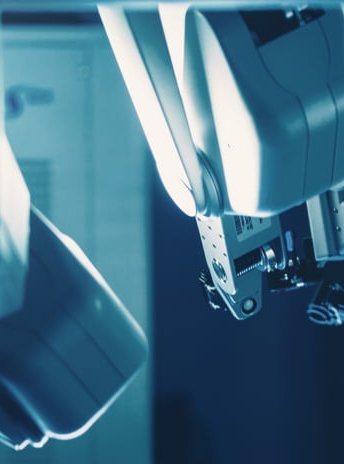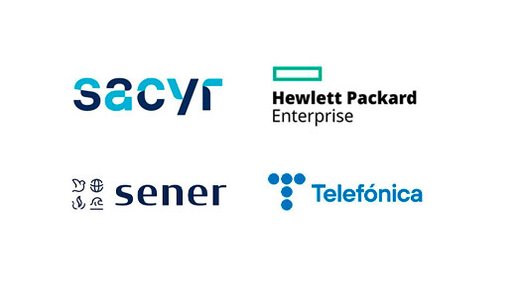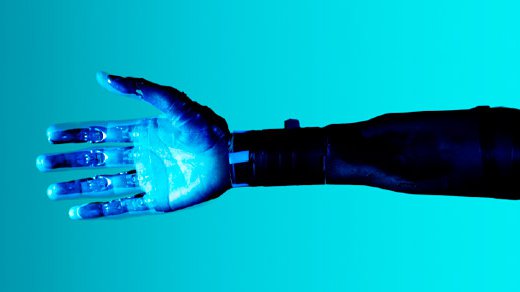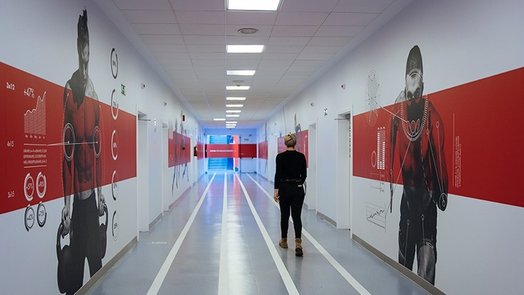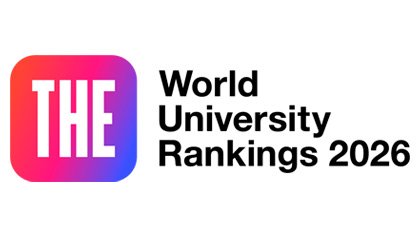-50% Descuento en reserva de plaza para curso 26/27 ¡Solo hasta el 28 de febrero!
BSC in Biomedical Engineering - Bachelor's Degree
The biomedical engineering industry is rapidly expanding to incorporate big data, the internet of things and data-driven science. We at Universidad Europea have updated the curriculum to include the most innovative developments being rolled out across the industry: biomaterials, nanotechnology and robotics.
You will train to become a biomedical engineer under the guidance of our teaching staff, all of whom are experienced educators and have a background in business and the health sector. You will have the chance to undertake an internship at key companies operating in the sector, such as Medtronic.
*This program is under verification and may be subject to change.
Official degree issued by Universidad Europea de Madrid
| Campus-based | Villaviciosa de Odón | 4 years, 240 ECTS | Start: 14 sep. 2026 | School of Architecture, Engineering, Science and Computing - STEAM |
Curriculum
Study plan structure
PRIMER CURSO
| Materia | ECTS | Tipo | Idioma de impartición |
|---|---|---|---|
| Cálculo I | 6 | BASICA | Español (es) |
| Química | 6 | BASICA | Español (es) |
| Fundamentos de Programación | 6 | BASICA | Español (es) |
| Ética y Eficacia Profesional | 6 | OBLIGATORIA | Español (es) |
| Bioquímica y Biología Celular | 6 | BASICA | Español (es) |
| Álgebra | 6 | BASICA | Español (es) |
| Programación Avanzada | 6 | OBLIGATORIA | Español (es) |
| Cálculo II | 6 | BASICA | Español (es) |
| Fundamentos Físicos de la Ingeniería | 6 | BASICA | Español (es) |
| Proyecto de Ingeniería | 6 | BASICA | Español (es) |
SEGUNDO CURSO
| Materia | ECTS | Tipo | Idioma de impartición |
|---|---|---|---|
| Bioestadística | 6 | BASICA | Español (es) |
| Estructura y Función del Cuerpo Humano I | 6 | BASICA | Español (es) |
| Sistemas Lineales | 6 | OBLIGATORIA | Español (es) |
| Fundamentos de Biomecánica | 6 | BASICA | Español (es) |
| Fundamentos de Circuitos Eléctricos y Electrónicos | 6 | OBLIGATORIA | Español (es) |
| Electrónica Digital y Microprocesadores | 6 | OBLIGATORIA | Español (es) |
| Proyecto de Telemedicina | 6 | OBLIGATORIA | Español (es) |
| Estructura y Función del Cuerpo Humano II | 6 | BASICA | Español (es) |
| Electrónica Analógica | 6 | OBLIGATORIA | Español (es) |
| Proyecto de Bases de Datos | 6 | OBLIGATORIA | Español (es) |
TERCER CURSO
| Materia | ECTS | Tipo | Idioma de impartición |
|---|---|---|---|
| Señales Biomédicas | 6 | OBLIGATORIA | Español (es) |
| Biomecánica del Cuerpo Humano | 6 | OBLIGATORIA | Español (es) |
| Procesamiento de la Señal | 6 | OBLIGATORIA | Español (es) |
| Sensores y Actuadores Médicos | 6 | OBLIGATORIA | Español (es) |
| Genética | 6 | OBLIGATORIA | Español (es) |
| Proyecto de Neurorrehabilitación | 6 | OBLIGATORIA | Español (es) |
| Procesado de Imagen Médica | 6 | OBLIGATORIA | Español (es) |
| Liderazgo Emprendedor | 6 | OBLIGATORIA | Español (es) |
| Minería de Datos en Biomedicina | 6 | OPTATIVA | Español (es) |
| Introducción a la Nanotecnología | 6 | OPTATIVA | Español (es) |
CUARTO CURSO
| Materia | ECTS | Tipo | Idioma de impartición |
|---|---|---|---|
| Biomateriales e Ingeniería de Tejidos | 6 | OBLIGATORIA | Español (es) |
| Empresa y Legislación | 6 | OBLIGATORIA | Español (es) |
| Técnicas de Imagen Biomédica | 6 | OBLIGATORIA | Español (es) |
| Prácticas Externas | 6 | OBLIGATORIA | Español (es) |
| Trabajo Fin de Grado | 12 | OBLIGATORIA | Español (es) |
| Ampliación de Prácticas | 6 | OPTATIVA | Español (es) |
| Actividades Universitarias | 6 | OPTATIVA | Español (es) |
| Sistemas de Intervencion Clínica | 6 | OPTATIVA | Español (es) |
| Sistemas de Movilidad | 6 | OPTATIVA | Español (es) |
| Robótica | 6 | OPTATIVA | Español (es) |
Prácticas profesionales
Internships in companies are a key element in your training. Gaining experience after what you have learned in your degree is the best way to enter the labor market. There are two types of internships, curricular (included in your curriculum) and extracurricular (those you can do voluntarily).
To carry out curricular internships in companies, you will need to have 50% of the credits approved and enroll the subject before starting your internship. These practices are monitored by the company and the internship teacher, as well as the realization of intermediate and final reports for evaluation.
If you want to improve your work experience before finishing your university education, you can do extracurricular internships. You can do them in any course but we remind you that the practices are a training complement to your studies; Therefore, the more knowledge you have acquired throughout the career, the more you will get out of the internship experience.
Employability
Biomedical Engineering Career Prospects
Biomedical engineering is a fast-growing profession driven by rapid changes taking place across the health sector, the development of R&D and new fields of action in medicine. Biomedical engineers are highly valued by companies due to the versatility of engineering degrees and specialisation in the biomedical field. Given the potential significant global reach of the sector - judging by the investment of large multinationals in research and by the opportunities open to specialists - the employment prospects of those with a qualification in this field will be somewhat enhanced.
Biomechanics
- Biomaterials.
- Biomechanical Studies for Athletes.
Bioinformatics
- Data Scientist.
- Medical Informatics.
- Telemedicine.
- Clinical Decision Support Systems.
Electromedicine
- Dosimetry.
- Biomedical Instrumentation.
- Technical Support during Surgery.
Bioinstrumentation
- Medical Imaging: Acquisition, Analysis and Processing
- Biomedical Devices.
- Biomedical Signals and Systems: EEG, ECG, EMG, etc.
- Robotics and Artificial Vision.
Teaching and R&D
- Teaching in the Public and Private Sector.
- Training of Clinical Specialists in the use of Devices.
- R&D Departments
- Research Centres of Public Bodies.
Start up
- Tech Start Up
Admissions
Start your future at Universidad Europea
You can become a student at Universidad Europea in three easy steps.
1
Admission exams
Start your admission process by calling +34 918257503 or request information and our advisors will contact you.
2
Place reservation
Once you have been admitted, secure your place by paying the reservation fee.
3
Enrollment
Submit the required documents to formalise your enrollment.
Scholarships and financial aid
We want to help you. If you want to study at Universidad Europea, you will have at your disposal a wide selection of own and official scholarships.
Credit recognition and transfers
You don’t have to stick with something you don’t like. That’s why we’ve designed specific plans for credit recognition and transfers.
Request your online credit recognition review, transfer your academic file and start studying at Universidad Europea.
Profile for prospective students and how to access this degree
You can access the Degree in Biomedical Engineering if you come from any modality of the Baccalaureate or from a Higher Level Training Cycle in the branch of Science and Technology.
It is advisable that students show certain attitudes and knowledge such as:
- Interest in applying technology in the field of health.
- Creativity and critical spirit.
- Aptitude for handling and interpreting quantitative information.
- Adequate use of computer tools.
- Willingness to learn languages, especially English.
For those students who access this degree, by passing the PAU after the baccalaureate and according to the experience gathered so far, it is considered that at the moment the ideal entry profile, and therefore to be recommended, are three of the current baccalaureate, specifically, the Technological, Health Sciences and Social Sciences. The first two have a greater formal preparation and in the third one the students have studied specific subjects closer to the contents of this degree.
Open days
Participate in our Open Days to learn first-hand about our advanced academic model of experiential learning, the teaching team that is already thinking about your future, the different training programs that we offer and how you will begin your studies this coming academic year.
14 February
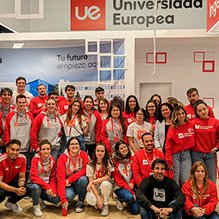
Come and see the campus
Get to know the facilities and discover why Universidad Europea is made for you.
Faculty
65% of the teaching staff are PhD professors.
Our teaching staff
- Ana Medina Palomo
Ingeniera Industrial. Máster en Ingeniería Matemática y Doctora por la UC3M en el programa de Ingeniería Mecánica. Profesora de la Escuela de Arquitectura, Ingeniería y Diseño de la UEM desde febrero de 2021 en asignaturas de las áreas industriales, aeroespacial, biomédica y matemáticas. Tutor de Trabajos Fin de Grado. Postdoc en University of California San Diego en el área de medicina física trabajando en proyectos relacionados con imagen médica y técnicas de radioterapia, desde mayo 2016 a septiembre 2019. - Álvaro Bustamente
Profesor e investigador en la Facultad de Ciencias de la Actividad Física, Deporte y Fisioterapia. Doctor en Actividad Física y Deporte (2020), Profesor Contratado Doctor reconocido por ANECA (2021) y con un sexenio investigador reconocido por CNEAI (2022). Ingeniero en informática (especialidad en Inteligencia Artificial), Graduado en Actividad Física y Deporte, Máster en Rendimiento Deportivo, Formación del profesorado y Big Data aplicado al deporte. Miembro del grupo de investigación en Psicofisiología aplicada, su actividad investigadora se ha centrado en el análisis de los indicadores de rendimiento psicofisiológico en atletas y unidades profesionales de élite. - Antonio Garrido Tarrío.
Licenciado en Ciencias Biológicas y Doctor en Biología por la Universidad Complutense de Madrid. Durante su etapa predoctoral realizó diferentes estancias en centros de investigación tanto nacionales como internacionales. Posteriormente, realizó una estancia postdoctoral en el Centro Nacional de Biotecnología (CNB-CSIC). Su trayectoria científica se compone de más de 20 artículos científicos publicados en revistas científicas relevantes en su campo de investigación. También ha asistido a numerosos congresos participando como ponente (más de 40 congresos tanto nacionales como internacionales). Además, ha dirigido diferentes trabajos fin de grado y de máster, así como dos tesis doctorales. Sus líneas principales de investigación se centran en el papel que juega el sistema inmunitario como marcador de envejecimiento y longevidad. - Borja Gonzálvez
Ingeniero de Telecomunicaciones. Ha sido Especialista de Producto de Electrofisiología en Boston Scientific. Desde 2010 ha ejercido como Especialista de Producto, Manager Clínico y Jefe de Producto en Nuubo, una empresa biomédica española de desarrollo de textiles biomédicos y detección de arritmias que ha certificado sus productos para venta en Europa y Estados Unidos (CE y FDA) - Carlos Alberto Talayero Gimenez de Azcarate
Ingeniero Industrial. Doctor por la UPM en el programa de Ingeniería Mecánica. Profesor de la Escuela de Arquitectura, Ingeniería y Diseño de la UEM desde 2014 en asignaturas de las áreas industrial, aeroespacial y biomédica. Tutor de Trabajos Fin de Grado y Máster. Investigador del grupo de "Nuevos materiales para la ingeniería" Director técnico en consultoría de Ingeniería de producto para los sectores de la Automoción y del Ferrocarril. Experto en modelado y simulación de sistemas mecánicos para sectores industriales - Carlos Castellote Varona
Doctor Ingeniero Industrial. Especialidad Mecánica. Profesor de la Escuela de Arquitectura, Ingeniería y Diseño de la UEM en asignaturas del área industrial y biomédica, principalmente de conocimiento de ingeniería mecánica. Tutor de Trabajos Fin de Grado y Máster. Coordinador de materias. Investigador en materiales y sus aplicaciones industriales y biomédicas.mExperto en cálculo por elementos finitos y ruido. Ha trabajado en varias ingenierías y consultoría multinacional. - Carlos Iglesias Álvarez
Diplomado en ingeniería Informática por a UEM. Profesor titular de la Universidad Europea de Madrid. Con más de 30 años de experiencia en el ámbito profesional y en el desarrollo de aplicaciones de gestión, la administración de sistemas en entornos LINUX y en el diseño e implementación de arquitecturas de red y redes inalámbricas. - Christian Vladimir Sucuzhanay Arévalo
Desde los 20 años he creado proyectos, sociedades, empresas en varios ámbitos y en diferentes países, lo que me ha convertido en un emprendedor con dotes de liderazgo, capacidad de gestión y toma de decisiones. Llevo varios años impartiendo las asignaturas de: Proyectos de Big Data I, II, programación concurrente y distribuida, liderazgo emprendedor, lenguajes de programación estadística, todos relacionados con nuevas tecnologías, Big Data y emprendimiento. - Enrique Olabuenaga Garzón
Graduado en ingeniería biomédica. Responsable de programas y proyectos en Comitas e-Health centrada en el desarrollo de proyectos de telemedicina. Más de 10 años de experiencia en el ámbito de la salud, de las tecnologías de la información y las telecomunicaciones, desarrollando funciones de project y product manager, integration manager y técnico de electromedicina - Fernando Aparicio Galisteo
Licenciado en Ciencias Físicas, MBA, MSc. (Inteligencia Artificial Avanzada), PhD. (Ingeniería Multidisciplinar). Desde el año 2010, profesor en el Departamento de Sistemas Informáticos, Automática y Comunicaciones de la UEM (DSIAC), e investigador en el Grupo de investigación en Sistemas Inteligentes (GSI). - Fernando de Miguel Pedrero
Profesor del departamento de Ciencias de la Salud de la Facultad de Ciencias Biomédicas de la Universidad Europea de Madrid. Doctor en Ciencias Biológicas, con 30 años de experiencia en investigación biomédica, en cinco centros de investigación, incluyendo ocho años en EE. UU. Participación en 7 proyectos de investigación en concurrencia competitiva como investigador principal y en 12 como colaborador. Más de 50 publicaciones en revistas científicas indexadas. Director de 3 Tesis Doctorales, 2 Trabajos Fin de Máster y 1 Fin de Grado. Acreditación ANECA como Profesor Contratado Doctor, Profesor Ayudante y Profesor de Universidad Privada. Reconocimiento de la CAM como personal con capacitación para la realización de eutanasia (B), experimentación (C) y diseño (D) de proyectos y procedimientos de experimentación con animales con fines científicos y de docencia. - Gonzalo Mariscal Vivas
15 años de experiencia en puestos de dirección, gestión de equipos, desarrollo de negocio y gestión de proyectos a nivel nacional e internacional en el ámbito de la educación y las tecnologías de la información. Actualmente es Director del Departamento de Ciencia, Computación y Tecnología de la Universidad Europea de Madrid liderando un equipo de 70 personas. También es docente en las titulaciones de Ingeniería informática y Diseño de Videojuegos, donde imparte asignaturas relacionadas con la Gestión de Proyectos y las tecnologías de Realidad Virtual y Aumentada. Formación: Doctor en Tecnologías de la Información Aplicadas (UEM), Máster en Ciencias de la Computación e Inteligencia Artificial (UPM), Ingeniero en Informática (UPM) y MBA - Máster Universitario en Dirección de Empresas en UEM. - Isabel Sutil Martín
Ingeniera Informática con un master en Big Data. Analítica avanzada y Tecnología. Con experiencia investigadora centrándose en los Vehículos Autónomos Conectados (VAC). Tiene experiencia laboral empresarial en la rama del Big Data. Actualmente docente a tiempo completo en la Universidad Europea. - Jairo García Fernández
Ingeniero Superior en Informática por la UEM, estudios adicionales: MBA por la UPM, Máster en Big-Data por el MIT, MDA por ISDI, CAP en Matemáticas por la UAM. Ciclo de vida del dato / Fuentes de la Información. 20 años de vida profesional como consultor tecnológico pasando por distintos sectores y países. Especializado en la gestión del dato y su gobernanza. - Gracia Morales Kucharski
Profesora Titular en el departamento de Ciencias de la Salud de la facultad de Ciencias Biomédicas en la Universidad Europea de Madrid. Doctora en Ciencias Biológicas. Acreditada como profesor contratado doctor y profesor de universidad privada. Licenciada en Ciencias Biológicas. Experiencia docente universitaria de más de 15 años (Universidad Autónoma de Madrid, Universidad Complutense de Madrid, Universidad Europea de Madrid los últimos 10 años). Experiencia en investigación científica, en el área de la biomedicina, de más de 25 años. Participación en 13 proyectos de investigación de financiación pública, uno de ellos como IP. Dirección de dos tesis doctorales. Investigación en innovación docente en la Universidad Europea. Cuenta con 25 publicaciones en revistas indexadas JCR de alto impacto. - Javier Jesús Collado Gutiérrez
Mechatronics Engineer por Staffordshire University. Graduado en Ingeniería en Electrónica Industrial y Automática por la UEM. Ingeniero Industrial por la UEM. Técnico de laboratorio de la Escuela de Arquitectura, Ingeniería y Diseño de la UEM de 2016 a 2021. Profesor de la Escuela de Arquitectura, Ingeniería y Diseño de la UEM desde 2021 en asignaturas de las áreas industrial, aeroespacial y biomédica. Responsable de innovación, producto y procesos en empresa del sector agroalimentario. Gerencia de equipo de calidad y seguridad alimentaria. Gestión de logística "end to end" del campo a distribución internacional. Departamento de I+D+i en empresa de impresión 3D. Experto en prototipado rápido mediante fabricación digital de productos tecnológicos. - José Luis Lafuente Carrasco
Graduado en Ingeniería electrónica y automática. Master en ingeniería de organización industrial, dirección de empresas y proyectos. Doctorando en Biomedicina y ciencias de la salud. Profesor de la Escuela de Arquitectura, Ingeniería y Diseño de la UEM desde 2017 en asignaturas de las áreas industrial, informática y biomédica. Tutor de Trabajos Fin de Grado y Máster. Más de 20 años en diferentes puestos de Electrónica, como diseño de circuitos embebidos, dirección de departamentos (I+D, Fabricación). Responsable del departamento de compras. Colaboración con diferentes empresas del sector de la ingeniería en proyectos de automatización. Formación a empresas. Consultoría técnica. Trabajo por cuenta propia con diferentes clientes del sector - Juan Antonio Guevara
Doctor en Data Science por la Facultad de Estudios Estadísticos en la Universidad Complutense de Madrid. Sus principales líneas de investigación se centran en el Social Big Data Analysis, estudiando fenómenos sociales en las redes sociales online, como la polarización social y política. Actualmente, presenta diversas publicaciones en revistas en impacto JCR y SJR, así como participación y coordinación de congresos nacionales e internacionales de gran importancia en el ámbito de la computación y sociología. - Juan Antonio Piñuela Izquierdo
Doctor Ingeniero de Telecomunicación por la Universidad Politécnica de Madrid. Especializado en asignaturas de procesamiento de señales, comunicaciones y desarrollo software. Destacar siete publicaciones y ocho contribuciones a congresos en el ámbito de procesamiento de señales y en especial imágenes. Experiencia profesional en labores de gestión, preventa y análisis-programación en distintos proyectos y empresas involucradas en el desarrollo de soluciones multiplataforma de carácter multimedia o de gestión y análisis de datos. - María Antonia Cid Torres
Profesora del departamento de Odontología pre-clínica, de la Facultad de Ciencias Biomédicas y de la Salud. Doctora en Bioquímica por la Universidad Autónoma de Madrid y Licenciada en Biología especialidad Biología Molecular por la Universidad Autónoma de Madrid. Ha formado parte de dos grupos de Investigación del Hospital Universitario Ramón y Cajal (Bioelectromagnetismo y Neurobiología) con los que inició y ha seguido desarrollando diferentes líneas de investigación sobre los efectos biológicos de los campos magnéticos y radiofrecuencias y sobre regeneración neuronal. En la actualidad pertenece al grupo de investigación en Neurobiología del Desarrollo de la Universidad Europea de Madrid y cuenta con más de 12 artículos en revistas indexadas y ha asistido como ponente a varios congresos científicos internacionales. Ha participado en más de seis proyectos de investigación y es codirectora de una Tesis Doctoral. - María de la Luz Morales Botello
María de la Luz Morales es Licenciada en Físicas por la Universidad Complutense de Madrid. Realizó un máster oficial en "Neurociencia y Biología del Comportamiento" en la Universidad Pablo de Olavide de Sevilla (2008) donde posteriormente, se doctoró en Neurociencias (2016), trabajo por el que recibió el Premio Extraordinario de Doctorado. Tiene una trayectoria multidisciplinar que comenzó como programadora en una empresa tecnológica (Ingeniería de Software Avanzado, IBM Global Services, 2005-2006). Tras este período se incorporó como investigadora pre-doctoral en el Grupo de Bioingeniería y Neurofisiología Experimental del Hospital Nacional de Parapléjicos de Toledo, donde se formó en técnicas experimentales y computacionales. En 2013 se incorporó como investigadora en la Universidad Europea de Madrid (UEM), dirigiendo así su campo de experiencia hacia el procesamiento del lenguaje natural, IoT y tecnologías orientadas a Big Data para aplicaciones a la salud y participando/dirigiendo proyectos internos y nacionales en el área. Así mismo, ha ganado experiencia en estudios cualitativos y cuantitativos de percepciones en humanos. Desde 2017 ejerce su actividad docente en la UEM dentro del área de las ingenierías informática y biomédica, principalmente. Ha dirigido numerosos trabajos fin de grado y máster y ha sido directora del Máster Universitario en Salud Digital en la UEM y coordinadora trabajos fin de grado. Actualmente, mantiene su actividad docente junto a su actividad como coordinadora de prácticas en empresa y es miembro del Comité de Empresa y del Comité de Seguridad y Salud de la UEM. Su actividad investigadora actual se enfoca hacia el estudio de la Sensibilidad del Procesamiento Sensorial. María de la Luz Morales es autora de más de 20 publicaciones en revistas y congresos científicos en áreas como la biomedicina, neurociencia y tecnología. - María José Terrón López
Licenciada en ciencias Físicas, especialidad electrónica (UCM), Doctora por la UP;. Acreditada en el área de tecnología electrónica con 2 sexenios de investigación. Catedrática del área de tecnología electrónica de la Universidad Europea de Madrid. Ciencias Físicas, especialidad Electrónica en la UCM. Doctorado en la UPM en el área de materiales semiconductores para su uso en la energía solar fotovoltaica. Trabajo en proyectos de investigación del área de la energía solar fotovoltaica, la tecnología electrónica, de la óptica aplicada y de la robótica y la investigación educativa. - Mariana Paula Arce García
Licenciada en Ciencias Químicas. Doctora por la UAM en el programa de Química Orgánica. Profesora de la Escuela de Arquitectura, Ingeniería y Diseño de la UEM desde 2010 en asignaturas de las áreas industrial, aeroespacial, biomédica, farmacia, biotecnología y óptica. Tutora de Trabajos Fin de Grado. Investigadora del grupo NanoUEM. Investigadora predoctoral y postdoctoral en el CSIC en los Institutos de Química Orgánica General y en el Instituto de Química Médica. Experta en Química Médica en el diseño y síntesis de moléculas para el tratamiento de enfermedades neurodegenerativas. Actualmente desarrollando y optimizando la síntesis y caracterización de nuevas moléculas nanocarbonadas con aplicaciones biomédicas. - Miguel Aparicio Resco
Físico teórico especializado en el análisis de datos y estadística con experiencia en programación. Realicé el grado en Física en la Universidad Complutense, obteniendo la mejor calificación de la promoción. A continuación, realicé el máster de física teórica y me doctoré por la misma Universidad en el campo de la Gravedad y Cosmología. Durante el doctorado, profundicé en el estudio de los mapas de galaxias y su análisis estadístico con el fin de extraer información de modelos de gravedad modificada. Para ello, adquirí una alta experiencia en programación con Python. Como resultado, he sido autor principal y coautor de un total de 8 artículos de investigación. - Paula Egido Iglesias
Ingeniera biomédica por la Universidad Europea de Madrid. Máster en Ingeniería Biomédica por la Universidad Internacional de Valencia. Ingeniera biomédica y DevOps en iAltitude, empresa especializada en equipos de hipoxia para los ámbitos deportivo, militar, sanitario y científico. Ha liderado el desarrollo de software IoT de las máquinas y app, así como participado en el equipo científico para investigación y divulgación en el campo de aplicaciones de la hipoxia intermitente. También es profesora en el departamento de Ciencia, Computación y Tecnología de la Universidad Europea de Madrid. - Santiago Torres Alegre
Ingeniero de Telecomunicación (UPM). Licenciado en Derecho (UNED). Master en Dirección Comercial y Marketing. 14 años de experiencia en operador de telecomunicaciones. 12 años como docente universitario. 6 años como consultor freelance. - Víctor Manuel Padrón Nápoles
Profesor Titular UEM. Doctor Ingeniero Industrial por la UC3M. Profesor de la Escuela de Arquitectura, Ingeniería y Diseño de la UEM desde 2002 en asignaturas de las áreas de ingeniería industrial, aeroespacial, telecomunicaciones y biomédica. Tutor de Trabajos Fin de Grado y Máster. Director de Tesis Doctorales. Investigador del grupo de "Sistemas Inteligentes", orientado hacia la Inclusión Social en las Ciudades Inteligentes y la aplicación de Big Data e IoT al Transporte Inteligente. Técnico, Ingeniero y director de proyectos relacionados con la Automatización y el desarrollo de sistemas electrónicos e informáticos durante 11 años.
Excellence endorsed by the best
Frequently Asked Questions
What is the Biomedical Engineering program?
The Biomedical Engineering program trains students who want to apply engineering principles in healthcare settings. It covers a broad range of fields, from medical instrumentation to information and medical image processing, biomechanics, health-related sensor design, robotics, and more—each aimed at supporting the healthcare sector.
What is Biomedical Engineering used for?
Biomedical Engineering is used to apply technological knowledge developed in engineering to the healthcare field. It specializes the engineer by providing complementary training in health-related topics (such as anatomy, kinematics, the cardiovascular system, neurology, etc.), enabling them to work in healthcare settings more effectively than they might with other engineering degrees.
What does a Biomedical Engineer work on?
Biomedical engineers work in any role that requires an engineer in the healthcare field. Some examples include:
- Medical Product Development Project Manager
- Technical Product Specialist
- Clinical Specialist
- R&D positions
- Quality management roles in medical companies
What can a Biomedical Engineer specialize in?
Once they have chosen the healthcare area they wish to work in, a biomedical engineer can further specialize through specific postgraduate programs. Fields like big data in medicine, implants, tissue engineering, biomedical imaging techniques, biomedical equipment and systems, telemedicine, control systems, and medical robotics are just a few examples of possible areas for specialization.
